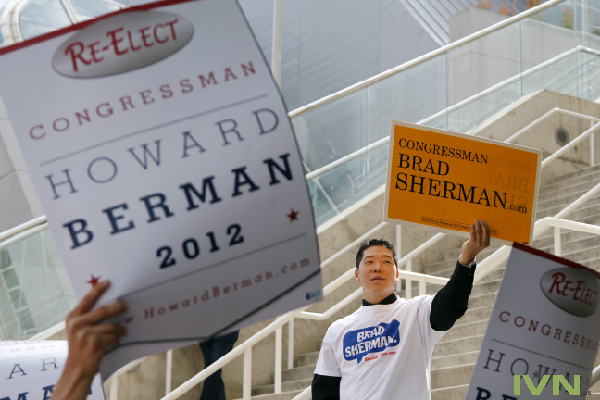Republicans to Endorse Democrat Berman in CA Congressional Race

 California's new Open Primary has pitted two Democratic incumbents, Rep. Howard Berman and Rep. Brad Sherman, against each other. After an ugly California Democratic Convention, where both candidates trashed each other, neither one secured the Democratic Party's nomination. Since the convention, both Democrats have been vying for the support of Republicans. Yesterday, Politico reported that Sens. John McCain (R-Ariz.), Lindsay Graham (R-S.C.) and Joe Lieberman (I-Conn.) will be endorsing Berman on Monday:
California's new Open Primary has pitted two Democratic incumbents, Rep. Howard Berman and Rep. Brad Sherman, against each other. After an ugly California Democratic Convention, where both candidates trashed each other, neither one secured the Democratic Party's nomination. Since the convention, both Democrats have been vying for the support of Republicans. Yesterday, Politico reported that Sens. John McCain (R-Ariz.), Lindsay Graham (R-S.C.) and Joe Lieberman (I-Conn.) will be endorsing Berman on Monday:
With Berman and Sherman locking in support among Democrats, it’s Republican voters who are up for grabs. Both California lawmakers have sought to appeal to Republicans in recent months - with Berman, a top Democrat on the House Foreign Affairs Committee, playing up his aggressive support for Israel. In rolling out support from the hawkish senators, Berman - who finished 10 percentage points behind Sherman in the primary and is considered the underdog in November - is hoping that he can win support from GOP voters who will have to make a choice between the two Democrats on Nov. 6.
Steve Peace, co-chair of the Independent Voter Project, authors of California's Open Primary Initiative, says, "this is precisely the outcome we were looking for. All voters should count and candidates who ignore voters in favor of excessive partisanship may find some difficulty with an empowered November electorate." In other words, after years of gerrymandering and closed primaries, heavily partisan districts that have traditionally had races decided in the primary by a relatively small portion of the population because there was no "real race" in the general election.
“Most legislative districts are so safe that the real battles are in the primary elections. Very liberal Democrats and very conservative Republicans usually win those primaries and go on to easy victories in the fall. This has led to deep, partisan divisions in the operation of the Legislature and a breakdown in debate and compromise.” - Serving the Polls, Not the People, Los Angeles Times, November 10, 2004.
What is less clear is how both candidates are going to handle the over 30% of voters in California's 30th Congressional District that are registered "no party preference."


